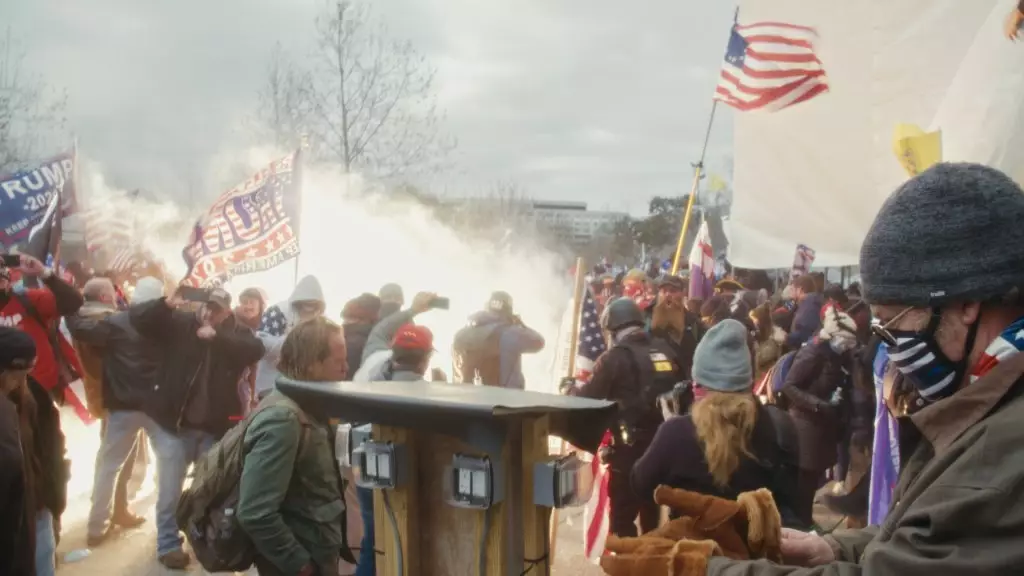The events of January 6, 2021, marked a significant chapter in the narrative of American democracy. ‘Fight Like Hell,’ directed by Jon Long, promises to provide a comprehensive glimpse into the chaotic and tumultuous moments that unfolded at the United States Capitol. Set to premiere on YouTube on September 24, this feature documentary aspires to be more than just a recounting of the riot; it aims to engage with the contextual roots that led to this unprecedented insurrection. Utilizing high-quality, previously unseen footage captured with a RED camera, the film enhances its storytelling intimacy while preserving the intensity of the day that shook the nation.
One of the most compelling features of ‘Fight Like Hell’ is its commitment to neutrality. The synopsis emphasizes that it avoids partisan commentary, allowing viewers to form their understanding of the events without external influences. This approach is significant, as it recognizes the polarizing views that surround the January 6 incident. By focusing on the raw visuals and authentic experiences, Long attempts to provide an immersive experience. This unbiased narration crafts a platform for viewers to traverse the timeline from the inception of the ‘Stop the Steal’ movement, through the court battles over election disputes, and into the streets, culminating in the harrowing behavior at the Capitol.
The synopsis indicates that the documentary does not merely aim to depict violence but rather seeks to unravel how passionate but erroneous beliefs can manifest into chaotic action. As audiences watch the events unfold, they may feel compelled to consider the power of misinformation and its role in inciting real-world chaos.
‘Fight Like Hell’ does not shy away from spotlighting significant personalities who played pivotal roles in the events surrounding January 6. Figures such as Roger Stone, Steve Bannon, Rudy Giuliani, and Ret. Lt. Gen. Michael Flynn are highlighted, showcasing the differing narratives they offered and the influence they wielded. Each figure represents a different facet of the political landscape during that period. For instance, Stone’s long-standing involvement in Trump-related movements since 2016 exemplifies a continuous thread of organized dissent. Similarly, Bannon’s strategies, which appeal to populist sentiments, underscore the manipulation of public discontent into political action.
Long’s decision to include these key figures offers the audience a multifaceted lens through which to understand the chaos. That these individuals are approaching or have been entangled in various legal predicaments adds another layer of complexity to the documentary, presenting them as both powerful actors and controversial figures against the backdrop of the Capitol crisis.
Reflecting on the broader implications of the January 6 events, Long articulates the divisive landscape that continues to grow around the narrative. The film’s director acknowledges that despite it being one of the most examined stories of our time, the ongoing polarization hampers a unified understanding of what transpired on that day. As a response, ‘Fight Like Hell’ positions itself as a necessary investigation into the multitude of perceptions that evolve within an emotionally charged climate.
In discussing the documentary’s release as independent content, Long suggests that the need for transparency and clarity is more urgent than ever. With many viewers entrenched in echo chambers where they only consume information that aligns with their existing beliefs, ‘Fight Like Hell’ seeks to bridge the gap—stimulating a conversation around the importance of shared realities and collective discourse.
Ultimately, ‘Fight Like Hell’ is positioned not just as a documentary but as a critical tool for reflection on American democracy and the complexities that define it. By challenging viewers to confront deep-seated divisions and misunderstandings, Long’s film invites a necessary examination of how history can inform our present in the realm of civic responsibility and active participation in democracy. In a climate saturated with misinformation, this documentary endeavors to illuminate truths and foster dialogue that could steer the future of the nation toward a more cohesive understanding of its past.


Leave a Reply